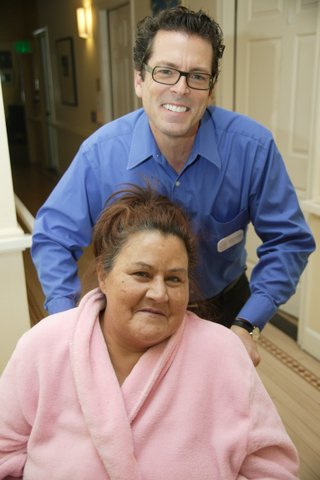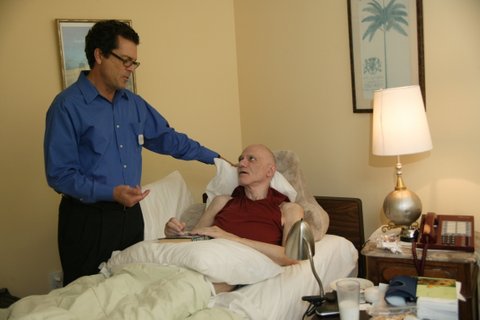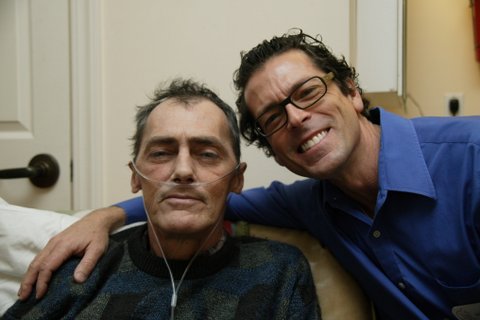
Michael Smithwick with a Maitri resident.
Michael Smithwick is the Executive Director of Maitri, a residential care facility in San Francisco for people living with AIDS. Maitri was founded in 1987 when Zen teacher Issan Dorsey took in a homeless student who was dying of AIDS. The word Maitri is a Sanskrit word that means compassionate friendship, and that is what this facility has been able to offer to those in need when everyone else turns their back.
Historically, people living with AIDS were shunned by family and friends and left without support. Now, with education and awareness efforts, coupled with advanced treatments that allow HIV/AIDS patients to live longer, healthier lives, the larger problem is a lack of access to health care. Maitri is committed to providing care and end-of-life services to those who are unable to afford them.
Dana: Can you begin with a brief overview of the organization for our readers who may be unfamiliar with it?
Michael: Maitri is a residential care facility for the chronically ill, especially those living with advanced HIV/AIDS. We’ve been doing it for 25 years, served thousands of San Franciscans. Increasingly with the changing AIDS pandemic and reduced numbers of deaths, especially in San Francisco, we are starting to see a trend. We are seeing an increasing number of residents here with advanced AIDS, but for the purposes of short-term medical stabilization [rather than end-of-life care].
Dana: When you started you were more like a hospice?
Michael: We were completely hospice, because there were no effective treatments for AIDS. People were literally dying on the streets in large numbers. So those who couldn’t find support from families or find access to health care had nowhere to go.
Dana: Were people often shunned by their families at that time?
Michael: I wasn’t with the organization at the time, but yes, it’s clear that was happening. Even children who were infected through blood transfusions were being put out by their families. Funeral parlors would refuse to prepare the remains of people who had died from AIDS-related illness.
I would like to think that that came from fear and ignorance, and not mean spiritedness.
Dana: Have you seen that change over time?
Michael: Oh, yeah. Now the AIDS pandemic is nearly 30 years old and there are treatments, and many people are able to tolerate them with success. So people are living much longer with AIDS.
Dana: How have you adapted to the changing need in your services as treatment for AIDS advances and changes?

Michael Smithwick with a Maitri resident.
Michael: Some of the thngs we’ve changed in our programming are helping people adjust to HIV medication protocols; we help residents gain access to medications and coordinate with physicians to ensure they’re taking them as prescribed. If they have trouble tolerating medications, we will deliver in advance of the dosage medications to prevent nausea or diarrhea, for example, as those are common side effects of the treatment. We also have a nutritional program, so we have a dietician that assesses the dietary and nutritional needs of residents. We’ve also recently started a smoking cessation program for our medication stabilization residents, so they have a better chance of living longer and healthier. That’s something that we certainly wouldn’t have had [when we were solely a hospice].
We’ve always had a waiting list, for 25 years, so the need exists for our services, and we always give priority to those in need of hospice care. Increasingly, we are not able to fill the beds with those in need of end-of-life care. So we make our way down the waiting list to those in need of medical stabilization.
Also, its not always clear when people come in whether they are in need of hospice care. They may have received a 6-month diagnosis, but not be willing to accept it, so we support their decisions to fight. Sometimes that will continue, and they meet their medical goals and we’re able to discharge them. Other times the treatments aren’t as effective as they hope, or they can’t tolerate them, so they stop them, and they become end-of-life hospice residents.
Dana: What do your day-to-day operations look like, for you as E.D. and for staff and volunteers?
Michael: As Executive Director, I’m involved in everything. We are an organization with an almost $2.5 million annual operating budget. We work with 48 employees, and 30 to 40 active volunteers. So I’ll deal with finance issues, payroll, bills, fundraising, as well as working with our program director and nursing services director to ensure that our nursing services are running smoothly and our social worker program is functioning well, and we’re providing the best services we can.
Dana: You cater largely to lower-income residents, is that right?
Michael: Yes. We provide services to those in most dire need of care first, those needing end-of-life care, and then we always give priority to those with the least resources. So, many of our residents are homeless or formerly homeless. Without us, they would literally be dying on the street or in the emergency room continually.
I always tell people, if you can’t relate emotionally to our organization, at least you can relate economically, because we provide services very efficiently, especially when compared with emergency room services, which are very costly and inefficient. We leverage private-sector donations and volunteers to run very efficiently.
Dana: I was surprised to learn these numbers: You have just 15 beds, and maintain a waiting list of between 14 to 20 at any given time. Those numbers seem surprisingly low compared to the enormity of the AIDS pandemic overall. Can you explain that?
Michael: Yes, that rate is based a lot on our pre-screening criteria — so anyone who has income or is wealthy, for example, would not be on the waiting list. Many times they can receive the support they need at home, and afford the health care they need.
Dana: So your numbers aren’t a good snapshot of the overall AIDS pandemic?
Michael: Right. There are more than 16,000 people in the city of San Francisco that have HIV. We serve a relatively small percentage of that population, those with the most dire need and the least resources. On the flip side of that, though, we see statistics that nine percent of AIDS-related deaths in San Francisco happen here.
Dana: Wow! What would explain that stark imbalance?
Michael: The majority of people dying with AIDS are lower income and haven’t had access to care — those we serve. It’s an inequality issue with regard to healthcare.

Michael Smithwick with a Maitri resident.
Dana: More generally, how can people support loved ones living with AIDS?
Michael: Compassion is number one. You need understanding and non-judgement. In the early days especially, they would throw family members out on the streets, and people weren’t getting the support they need. So acceptance, support, and expression of unconditional love is really important. There are many cases where people don’t even inform family members out of fear of being stigmatized or rejected, or they don’t want to upset, say, their mother or grandmother. But there’s a lot of fear there, so love and compassion are key.
Dana: Where can our readers go to find volunteer opportunities or other ways to support Maitri, and what are your needs?
Michael: They can go to MaitriSF.org for info about volunteering or donating. For those outside of San Francisco, providing financial support is critical. The federal government funding for HIV organizations is being reduced, so most are struggling, and we’re no exception.
Dana: What kinds of volunteer opportunities are available?
Michael: Our volunteer opportunities are diverse. We have volunteers who offer administrative support, like receptionist and filing. They can volunteer for fundraising events. The majority of our volunteers provide direct resident care, so they go through an extensive four-day training program to teach them how to care for people at or near the end-of-life.
Dana: Thank you so much for taking the time to talk, Michael!

Learn more about Maitri at www.maitrisf.org and follow on Twitter @maitrisf.
Image credit: Ron Henggeler

 How Can We Support Men and Women Living with AIDS? An Interview with Michael Smithwick
How Can We Support Men and Women Living with AIDS? An Interview with Michael Smithwick


 How Dare You Die Now!
How Dare You Die Now!
 Debating Medical Aid in Dying
Debating Medical Aid in Dying
 “Help Me, Helen”
“Help Me, Helen”














